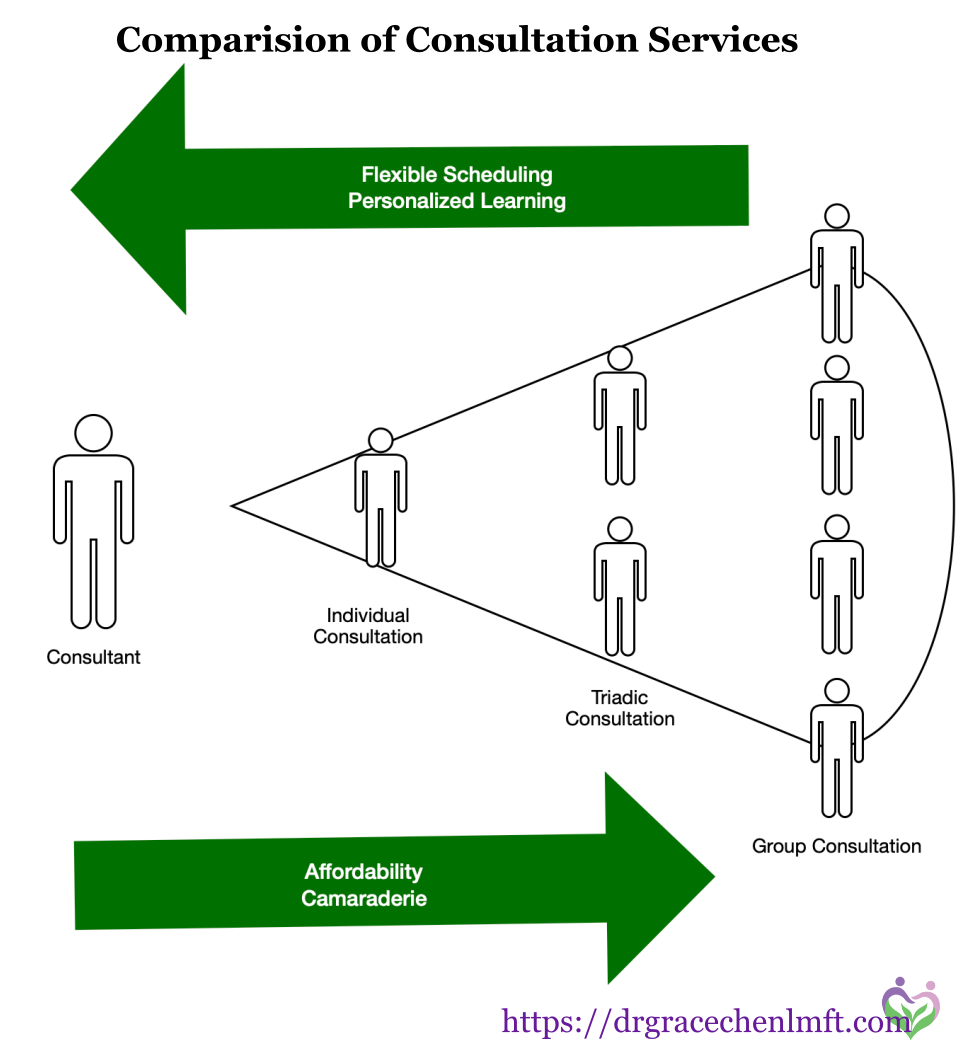Many clinicians who finished the first weekend or the basic training of EMDR never used this again. The top three reasons are: feeling overwhelmed, uncertain, and defeated.
Searching for a consultant or joining a consultation group is a no-brainer. However, how do you know which one to look for and what types of consultation work for you?
The first order of business is to decide what consultation works for you.
There are generally two types of consultation services: individual or group. I have been and continue to be in individual consultation. I was also in the group consultation for about three years after my basic training. Here are my experiences of the pros and cons of the types of EMDR consultation.
Individual consultation
Pros:
-
-
- Tailored to a clinician’s unique needs.
- Flexibility in the time and topics.
- Allowed in-depth discussion or watching videos.
- Horn into specific skills and issues to develop a particular niche.
-
Con
-
-
- Can be expensive
-
Group Consultation
Pros
-
-
- Cut down the cost
- Support and camaraderie from the colleagues
- Diversify the learning process by having viewpoints from constant and different colleagues
-
Con
-
-
- Inflexible time choices
- Less control in terms of the learning process and group dynamics
-
The more consultees include in the group, the more affordable the consultation cost. But, simultaneously, you get last control over your experiences.
To accommodate both, other than the individual and group consultation, I also offer the third one, the triadic consultation. You can share a time with another colleague to lower the consultation fee cost while receiving support from a colleague. In the meantime, you have some control over the learning process as it is easier to share the space with one person than with three other consultees.

The second step of the consideration is to consider the logistics.
- Do you want a consultant in the same time zone?
- Do you want a consultant to provide an in-person consultation?
- How much is your budget?
The third step of the consideration is to personalize your needs.
- What clientele are you passionate about working with, adult, female, BIPOC, etc.?
- What issues are you passionate about working with, trauma, depression, substance abuse, etc.?
- What are your background and specialties before learning EMDR? Do you want to incorporate your clinical experiences into your EMDR practice?
The fourth step is to choose the consultant based on the criteria you listed above.
The clearer you are about your logistical consideration and personal needs, the easier to narrow down the criteria for the constant criteria. At the same time, if you are unclear about your niche and need, a group consultation might be better than an individual consultation so that the other group members might inspire you to narrow your focus.
My Journey
I worked with a consultant-in-training to complete my EMDR basic training. My knowledge about EMDR and my budget were both limited at that time. My consultant-in-training was great to offer the basic EMDR training in terms of the 8-phase and 3-prolog concepts. After I finished my EMDR basic training, I first joined a consultation group. I had a limited budget but wanted to work with a certified consultant. I was also uncertain if I wanted to invest time to be certified in EMDR. However, I was very clear about working with a certified consultant because I wanted to work with a consultant with more experience in utilizing EMDR with a specific population and issues. I gained a lot of experience in group consultation and stayed for three years. I learned from my colleagues about their processes and struggles in integrating EMDR into their clinical work. I also deepened my understanding of using EMDR to work with different issues and diagnoses because of the diversity of the cases my colleagues brought into consultation.
I started looking for an individual EMDR consultant six months after my group consultation. By this time, I had experienced some success integrating EMDR into my clinical work and had decided to pursue certification. But, more importantly, I needed more tailored guidance than what group consultation could offer me.
The more I learned and received consultation individually, the more I realized how limited I am and how much EMDR can add to a client’s healing journey. I have witnessed clients gain coping strategies and transform their lives because of EMDR treatment. Therefore, after being certified in EMDR, I continue individual consultations every two to three weeks to deepen my understanding of this seemingly simple but not easy treatment method.
I hope my EMDR consultation journey adds a little help to your consultation searching process. Where are you in your EMDR learning journey? No matter where you are, I hope our path comes across, and I can be part of your journey in mastering this complex treatment method in your clinical practice.

2 Responses
Hi. What time zone are you in? Also what are you prices and availability please? I am EMDR trained since 7/21 and ready for certification.
Thank you for the questions. I am in Eastern Time Zone. Please also check this page for the information about pricing. https://drgracechenlmft.com/consultation/ As to the availability, please email me for specific date/time.